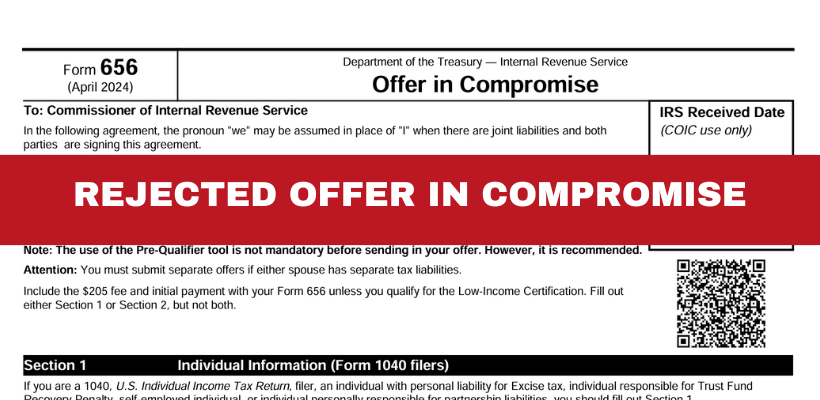Receiving a rejection notice for your Offer in Compromise (OIC) submission can be disheartening, but it’s not the end of the road. There are several steps you can take to respond effectively and work toward a resolution with the IRS.
Here’s what you should do if your OIC is denied:
1. Review the reason for rejection
When the IRS rejects an offer, they’ll provide specific reasons in their rejection letter. Common causes include:
- Insufficient offer amount: The IRS may believe you can afford to pay more than you offered.
- Incomplete financial disclosures: If your financial situation wasn’t clearly documented, the IRS may reject your offer.
- Eligibility concerns: The IRS might determine you don’t qualify based on factors like current tax filings or past compliance.
Review the letter carefully to understand the issues and assess whether you can make adjustments to improve your chances of approval.
2. Appeal the rejection
The IRS allows taxpayers to appeal an OIC rejection within 30 days of receiving the notice. To initiate the appeal process, you’ll need to submit Form 13711 (Request for Appeal of Offer in Compromise). During the appeal, it’s essential to present additional documentation or provide further explanation of your financial situation to strengthen your case.
The appeal process is a critical opportunity to address any misunderstandings or oversights that may have led to the rejection. Our team of tax attorneys and tax problem specialists can assist in gathering necessary documents and crafting a stronger argument.
3. Submit a new offer
Once you understand the reason for the rejection, you have the option to submit a new Offer in Compromise. In this case, you’ll need to address the IRS’s concerns. This could mean increasing your offer, providing more comprehensive financial information, or ensuring all tax filings and payments are up-to-date.
When submitting a new offer, it’s important to make sure that your financial documentation is complete and accurate to avoid delays or future rejections.
4. Consider other IRS Programs
If you find that an OIC is not the right fit for your situation, there are other IRS programs designed to help taxpayers resolve their tax debts. Some of these include:
- Installment Agreement: This allows you to pay your tax debt over time through manageable monthly payments.
- Currently Not Collectible (CNC) Status: If you’re experiencing financial hardship and cannot make payments, the IRS may place your account in CNC status, pausing all collection activity.
These options can provide relief and help you work toward resolving your tax debt even if the OIC doesn’t go through.
Final Thoughts
While an Offer in Compromise rejection can be frustrating, it’s not the final word. By carefully reviewing the rejection letter, considering an appeal or a new submission, and exploring alternative resolution options, you can still work toward resolving your tax debt.
Handling the OIC process and dealing with a rejection can be complex, and consulting with a tax professional can make a significant difference.
At the law office of Steven N. Klitzner, we can assess your financial situation, assist with the appeal or new submission, and guide you toward the best resolution strategy for your tax debt. Call us today at (305) 564-9199 or fill out our website contact form to schedule a free and confidential consultation!







 Steven N. Klitzner, P.A. is a tax attorney based in Miami, Florida. He has been practicing tax law for over 40 years, and currently holds a 10.0 rating by Avvo. Mr. Klitzner was appointed to the IRS Service Advisory Council in 2021 and is...
Steven N. Klitzner, P.A. is a tax attorney based in Miami, Florida. He has been practicing tax law for over 40 years, and currently holds a 10.0 rating by Avvo. Mr. Klitzner was appointed to the IRS Service Advisory Council in 2021 and is... 





